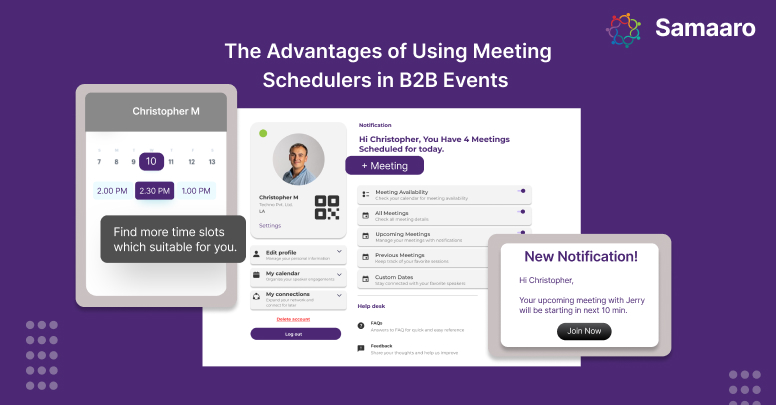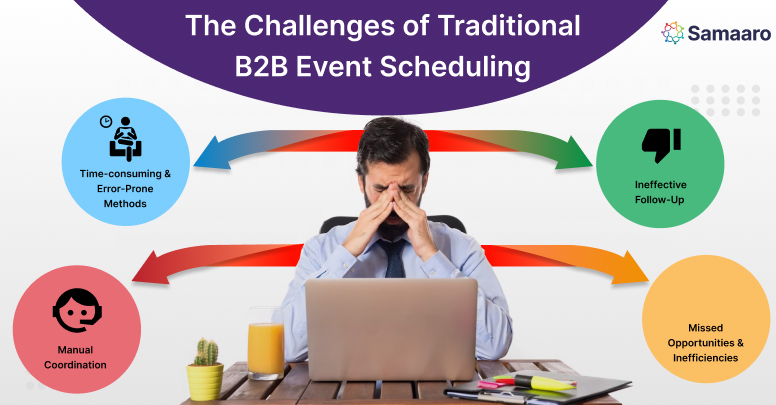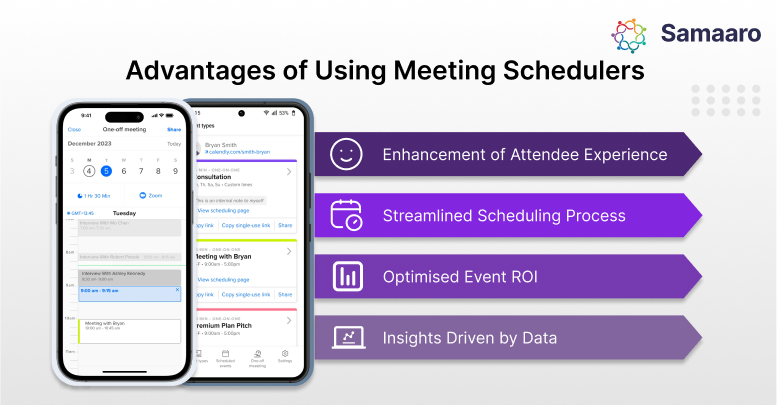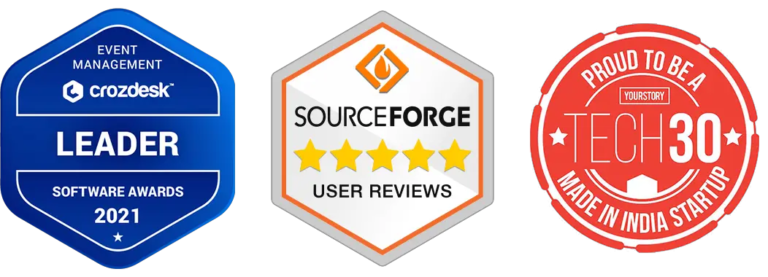Samaaro + Your CRM: Zero Integration Fee for Annual Sign-Ups Until 30 June, 2025
- 00Days
- 00Hrs
- 00Min

In the dynamic business world, B2B (Business-to-Business) events serve as centres where industry leaders, professionals, and innovators congregate to forge connections, spark collaborations, and propel progress. In addition to exhibiting products and exchanging business cards, the purpose of these events is to foster meaningful interactions and fruitful partnerships. However, effectively orchestrating these interactions is no simple task. This is where meeting schedulers’ transformative power comes into action.
In essence, pre-meeting schedulers are the architects of these interactions. Through digital platforms you can organise meetings, sessions, and networking opportunities for event attendees. The significance of scheduling in B2B events cannot be emphasised, as it can make or break the experience of attendees, impact the ROI for businesses, and ultimately determine the event’s success. We will delve into the various challenges encountered in manual scheduling processes, explore the advantages of using meeting schedulers and more.

A. Time-consuming and Error-Prone Methods
Traditional B2B event scheduling methods often involve a laborious process of spreadsheets, emails, and phone calls. Organisers must contend with the complexities of coordinating schedules, preventing double reservations, and accommodating last-minute adjustments. This procedure is not only time-consuming, but also prone to human error, which can result in lost opportunities and dissatisfied attendees.
B. Missed Opportunities and Inefficiencies
One of the major disadvantages of manual scheduling is the possibility of squandered opportunities. Due to scheduling conflicts, attendees may not connect with the right individuals or attend the most pertinent sessions. Moreover, inefficiencies in the scheduling process can lead to lengthy wait periods, leaving attendees frustrated and disengaged. These wasted opportunities and inefficiencies can have a direct impact on the event’s success and its capacity to provide attendees and exhibitors with value.
C. Ineffective Follow-Up
Follow-up after a B2B event is essential for solidifying the connections established during the event. Nevertheless, traditional scheduling methods typically lack built-in follow-up mechanisms. This can lead to missed opportunities to cultivate relationships and convert prospective prospects into profitable business partnerships.
D. Manual Coordination
In a conventional scheduling scenario, meeting coordination falls solely on the shoulders of event planners. This manual coordination can become overwhelming, particularly for large-scale events with numerous participants. Organisers are left to juggle schedules, make last-minute adjustments, and attempt to accommodate special requests, all of which can result in logistical complications.

A. Streamlined Scheduling Process
Meeting schedulers, the digital orchestrators of B2B events, bring order to the chaos. They automate the scheduling process, freeing up valuable organiser time and reducing the risk of scheduling errors by a significant margin. Equipped with user-friendly interfaces and advanced algorithms, these tools match attendees based on their preferences, availability, and even business objectives a breeze.
B. Enhancement of Attendee Experience
Meeting schedulers are customised to improve the experience of attendees. Attendees can now customise their event experience by selective selection of relevant sessions, meetings, and networking opportunities. With meeting schedulers, every moment at the event becomes a golden opportunity. Gone are the days of frustrating wait times and uncertainty as to whether an interaction will produce value.
C. Optimised Event ROI
With the introduction of meeting schedulers, the ROI (Return on Investment) for B2B events is substantially improved. These tools increase the likelihood of forming long-term partnerships and collaborations by facilitating precise matchmaking and targeted networking opportunities. The impact on businesses extends well beyond the event itself, making each interaction a long-term investment.
D. Insights Driven by Data
The additional benefit of meeting schedulers is that they capture invaluable data on attendee preferences, session popularity, and feedback. This abundance of data provides organisers with actionable insights that can inform strategic decisions, enhance future events, refine content, and improve networking strategies.
E. Confirmed Meetings & Attendance
The ability of pre-meeting schedulers to convert prospective or “maybe” meetings into confirmed ones is a significant advantage. In conventional B2B event scheduling, attendees frequently indicate an interest in meeting with potential partners or clients, but no firm commitment is made to attend. But with the emergence of pre-meeting schedulers, it guarantees that their investment in the event will yield tangible returns. The higher attendance rate for scheduled meetings contributes directly to the overall ROI of the event.
Meeting schedulers are the catalysts that drive B2B events into the future, encouraging innovation, collaboration, and success in a world where connections and relationships are at the heart of business. Don’t be left behind; instead, leverage the power of meeting schedulers to take your B2B events to new heights. Get ready for our upcoming blog, where we’ll dive into the impressive features Samaaro provides for pre-meeting scheduler, and how we’ve incorporated them to create a user-friendly and captivating experience.

Samaaro is an all-in-one event technology company that offers a comprehensive suite of event management solutions to help event organisers streamline operations, boost attendee engagement and maximise ROI of their events.


© 2025 — Samaaro. All Rights Reserved.